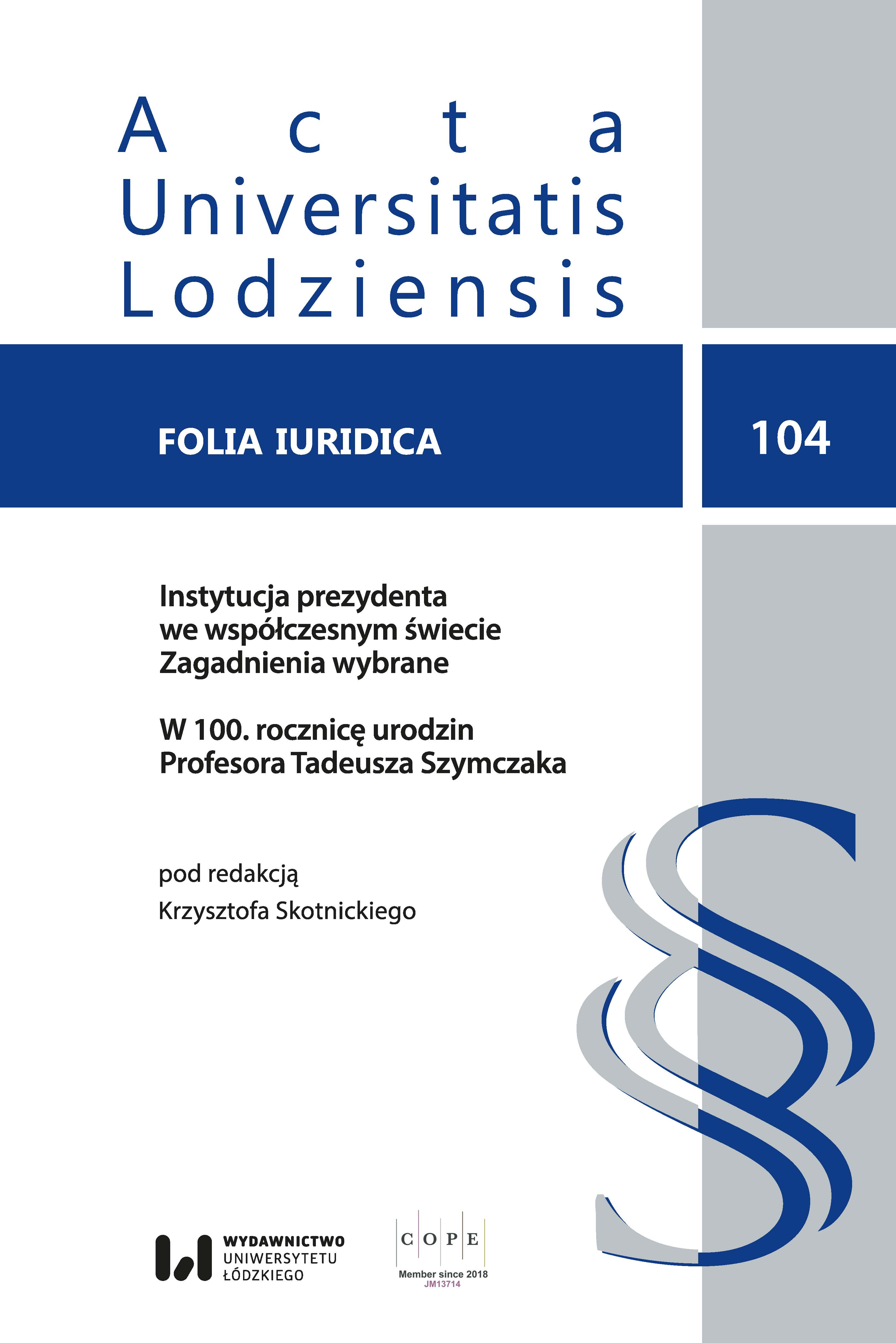The adaptation of the presidential system of government in the countries of South-Eastern Asia on the background of English literature
DOI:
https://doi.org/10.18778/0208-6069.104.08Keywords:
president, presidential system, Southeast Asia, presidency model, democratizationAbstract
The presidential system has been criticized for a long time, especially by political scientists. This system is characterized by a rigorous division (separation) of the legislative and executive powers and the combination of the functions of the president and the head of government. Pursuant to these principles, the president (as an organ of executive power) has full executive power and is exempt from responsibility before the parliament. Critics argue that this is a system that leads to instability in power. Recent research conducted in this regard on the governments of Southeast Asian countries that have adopted the presidential system of government seem to contradict this thesis. As a consequence, the presidential system of government has its supporters and opponents, strengths and weaknesses. Nevertheless, its characteristics do not in themselves prevent the construction of a lasting presidential democracy. How the presidential system of government will function in practice depends not only on the adopted formal institutional framework, but also on such variable and non-obvious factors as the personality of political actors, the party system, or – not only general – cultural issues.
Downloads
References
Antoszewski, Andrzej. 2014. „System polityczny jako przedmiot badań politologii i nauki prawa konstytucyjnego”. W Rozprawa o metodzie prawa i polityki. 13–28. Red. Mirosław Sadowski, Aleksandra Spychalska, Katarzyna Sadowa. Wrocław: Wydział Prawa, Administracji i Ekonomii Uniwersytetu Wrocławskiego, Wydawnictwo Beta-Druk.
Google Scholar
Beuman, Lydia M. 2016. Political Institutions in East Timor: Semi-presidentialism and Democratisation. Abingdon: Routledge. https://doi.org/10.4324/9781315668772
Google Scholar
DOI: https://doi.org/10.4324/9781315668772
Bünte, Marco. Mark R. Thompson. 2023. Presidentialism and Democracy in East and Southeast Asia. New York: Routledge. https://doi.org/10.4324/9781003211822
Google Scholar
DOI: https://doi.org/10.4324/9781003211822
Cheibub, Jose Antonio. 2007. Presidentialism, Parliamentarism and Democracy. Cambridge: Cambridge University Press. https://doi.org/10.1017/CBO9780511813344
Google Scholar
DOI: https://doi.org/10.1017/CBO9780511813344
Dahl, Robert. 1991. Modern Political Analysis. Prentice Hall: Englewood Cliffs.
Google Scholar
Dressel, Bjorn, Presidential Democracies in Asia Reflections from Indonesia and the Philippines DRAFT (forthcoming, Routledge Handbook on Asian Parliaments, edited by Rehan Abeyratne and Po Yen Yap. https://www.academia.edu/50950808/Presidential_Democracies_in_Asia_Reflections_from_Indonesia_and_the_Philippines_DRAFT_forthcoming_Routledge_Handbook_on_Asian_Parliaments_edited_by_Rehan_Abeyratne_and_Po_Yen_Yap?email_work_card=title (dostęp: 28.01.2023). https://doi.org/10.4324/9781003109402-7
Google Scholar
Dressel, Bjorn. Fakhridho Susilo. 2023. „Presidential Democracies in Asia”. W Handbook on Asian Parliaments. Red. Rehan Abeyratne, Po Yen Yap. Abingdon–New York: Routledge.
Google Scholar
DOI: https://doi.org/10.4324/9781003109402-7
Dressel, Bjorn. Francis Fukuyama. Boo-Seung Chang. 2005. „Facing the Perils of Presidentialism?” Journal of Democracy 16: 102–116. https://doi.org/10.1353/jod.2005.0026
Google Scholar
DOI: https://doi.org/10.1353/jod.2005.0026
Ellis, Andrew. Kirsti Samuels. 2021. Making Presidentialism Work: Sharing and Learning from Global Experience: A Summary of the International IDEA/UNAM Workshop. Stockholm: UNAM/IDEA. https://www.idea.int/publications/catalogue/making-presidentialism-work-sharing-and-learning-global-experience (dostęp: 3.02.2023).
Google Scholar
Fabbrini, Sergio. 1995. „Between Parliamentarism and Presidentialism: A Comparative Perspective on Governmental Systems”. Journal of Behavioral and Social Sciences 2: 109–129.
Google Scholar
Fabbrini, Sergio. 1999. „The American System of Separated Government: An Historical-Institutional Interpretation”. International Political Science Review 20: 95–116. https://doi.org/10.1177/0192512199201005
Google Scholar
DOI: https://doi.org/10.1177/0192512199201005
Jung, Jai Kwan. Christopher J. Deering. 2013. „Constitutional Choices: Uncertainty and Institutional Design in Democratising Nations”. International Political Science Review 11: 60–77. https://doi.org/10.1177/0192512113503929
Google Scholar
DOI: https://doi.org/10.1177/0192512113503929
Kasuya, Yuko. 2013. Presidents, Assemblies and Policy-making in Asia. Basingstoke: Palgrave Macmillan. https://doi.org/10.1057/9781137315083
Google Scholar
DOI: https://doi.org/10.1057/9781137315083
Linz, Juan. 1994. „Presidential or Parliamentary Democracy: Does It Make a Difference”. W The Failure of Presidential Democracy. Red. Juan Linz. Arturo Valenzuela, Baltimore: Johns Hopkins University Press. https://doi.org/10.56021/9780801846397
Google Scholar
DOI: https://doi.org/10.56021/9780801846397
Mainwaring, Scott. Matthew Shugart. 1997. Presidentialism and Democracy in Latin America. Cambridge: Cambridge University Press. https://doi.org/10.1017/CBO9781139174800
Google Scholar
DOI: https://doi.org/10.1017/CBO9781139174800
Michalak, Anna. 2017. Systemy konstytucyjne wybranych państw Azji Południowo-Wschodniej. Łódź: Wydawnictwo Uniwersytetu Łódzkiego. https://doi.org/10.18778/8142-537-7
Google Scholar
DOI: https://doi.org/10.18778/8142-537-7
Stokes, Susan C. 2013. Political Clientelism: The Oxford Handbook of Political Science. Oxford: Oxford University Press.
Google Scholar
Whittington, Keith E. 2007. „Constitutional Theory as Political Science”. W Constitutional Theory: Arguments and Perspectives. Red. Michael J. Gerhardt, Stephen M. Griffin, Thomas D. Rowe, Jr. Newark, NJ: LexisNexis.
Google Scholar
Downloads
Published
How to Cite
Issue
Section
License

This work is licensed under a Creative Commons Attribution-NonCommercial-NoDerivatives 4.0 International License.














